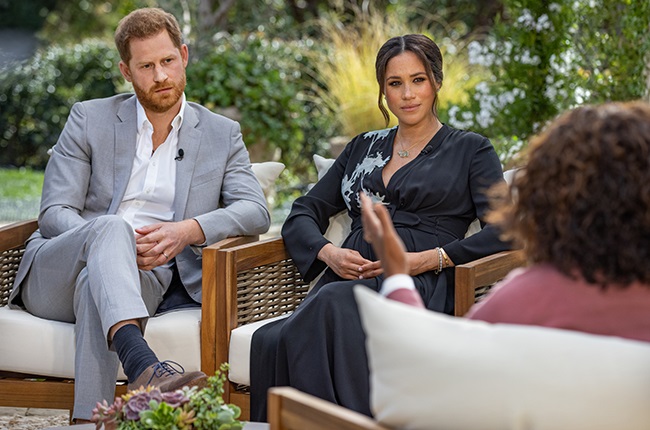
Our obsession over dark and light skin has been around since way before Harry and Meghan and is certainly not isolated to the Royal Family, writes Vanessa Govender.
I could almost hear the collective gasp in my head of the many South Africans, watching from their homes, as Harry and Meghan shared with Oprah the deeply disturbing details of how a family member expressed "concern" over what their child would look like and how dark his skin could be.
No sooner were the words out of their mouths and a tsunami of Facebook posts and Tweets flooded our timelines. The social media moral brigade were outraged. Who would dare to even raise an issue of skin colour of a baby in 2021? Why would what the child looked like, or his/her skin colour even matter in this day and age?
READ | Analysis: Meghan and Harry's Oprah interview: Why royal confessionals threaten the monarchy
Well, I hate to break it to you, but the obsession over dark and light skin has been around since way before Harry and Meghan and is certainly not isolated to the Royal Family.
One must just look at the beauty industry and the multitude of skin lightening products on offer to grasp the magnitude and depth of this prejudiced passion for fair skin.
'You pretty, even though you are dark'
Growing up in my conservative Indian community, I was often taunted, and my life made hell because I am dark skinned.
I would be told things like, "you are pretty EVEN THOUGH you are dark", or "NEVERMIND you are dark, you are still pretty", or my best, "if you were fair skinned, you would be even more beautiful", bigotry masquerading as compliments.
Indictments of "blackie" or "black thing" would be yelled across the playground or as I walked home from school.
Are you suitably shocked yet? Horrified perhaps?
Colourism (the term we have had to carefully come up with to explain this despicable and dangerous disease) is very much a part of life in my community, but certainly not isolated to it.
I have also been in the company of black or coloured friends, who would casually comment on how "dark" or how "black" someone from their own ethnicity was.
Internalised racism is a real thing and, arguably, perhaps just as or even more emotionally debilitating than experiencing discrimination from someone outside of one's own race group.
To be shamed and shunned for being dark skinned, that was my childhood and it even followed me into my twenties. It is not unusual to hear about prospective marriage partners being rejected by a family, simply because they are "too dark". Even newborn babies are not spared the condemnation of colour.
South Africans of Indian origin and, I daresay, even the black and coloured communities, have been battling their own skin colour demons for decades. No doubt a hangover from our colonial past, where white and light skin were seen as superior.
I think it would be foolish and extremely naïve to say we do not see skin colour.
It is impossible, I think not to see it. But when it becomes the crucifying characteristic with which we determine a person's worth and value as a human being, then we perpetuate the very prejudice that was and still is definitive of our apartheid past, making us no better than our oppressors.
For a long while, I remained in blissful ignorance of any contempt people would or could have for my three half-white, half-Indian children and their beautifully blended skin colour. My children would never know the heartache I endured for so many years, hating the skin I was in. But their neither dark nor quite white skin would be enough to spare them.
I believed our mixed family, like all others, epitomised all that is possible for a country that will always carry deep historic hurt.
I was in for a rude if not cruel wake-up call, which came at a summer social event in a village my family and I had barely just moved to.
It was so profoundly painful and embarrassing that it would take me close onto a year before I would share it with my husband.
A young white boy was admonished for not putting on sunscreen, and was told if he didn't he would "look like a Paki" (if you don't know that word, let me school you: Paki is a derogatory term used to describe Indian or brown people. Like the K word or the N word; it is vile, racist and hurtful).
Curse of colour
The message that was delivered to that little boy that day, as well as to my son and myself, who were in earshot of the callous comment was simply this - brown skin is a thing of revulsion.
I am not proud to say I sat there stunned and doing all I could to not burst into tears. I could not even bring myself to get my son and walk away for fear of offending the person who uttered the offensive word.
White suburbia had welcomed my mixed family, surrounded by liberals whose own close circles comprised of some white families with black children. How could my children and I not fit in right? But the curse of colour had followed us a million miles away from my childhood bullies and community of colour consciousness.
READ | Meghan Markle's story triggered me: My in-laws tried to bleach my child's skin
I can no longer be naïve enough to think that even educated, forward thinking people are without their prejudice.
I can no longer be naive enough to think our mixed family will always be welcomed, celebrated, or respected.
It is a lesson I really wish I did not have to learn.
How we navigate through these murky waters of my children not quite being white enough or Indian enough is going to demand an unapologetic and unrelenting attitude, that while I cannot block their ears and eyes to the hateful words and looks, I would and never again should ever shrink back from dealing with discrimination and racism with the same fire and contempt with which it is dispensed, and it rightfully deserves.
I have always felt a sense of responsibility to never fan the flames of racial discord by speaking about and of discrimination I or my family experience.
Our skin colour shouldn't be a thing of shame
It is no longer my job to preserve peace when prejudice is served or to protect people because they are of a certain race group for fear of tarnishing all others with that same filthy brush.
The truth, in all its brutal garishness, needs to be vented.
The colour of my skin or that of my children should never be a thing of shame for any of us, and anyone who feels emboldened enough to demean or diminish us because of it does not deserve the kindness of forgiving or the generosity of forgetting.
Like abuse, racism, colourism and discrimination thrive and survive on silence and shame of the victim.
There have been some who have taken their own lives because to breathe and be alive inside the darkness of their own skins were simply too much.
I write of my experiences not to punish those who have wounded me or others with their words and prejudice, but to hand back the shame to them because it is and always should be theirs to bare.
- Vanessa Govender is the author of 'The Selfish Shongololo' and 'Beaten but not broken'.
*Want to respond to the columnist? Send your letter or article to opinions@news24.com with your name, profile picture, contact details and location. We encourage a diversity of voices and views in our readers' submissions and reserve the right not to publish any and all submissions received.
Disclaimer: News24 encourages freedom of speech and the expression of diverse views. The views of columnists published on News24 are therefore their own and do not necessarily represent the views of News24.




 Publications
Publications
 Partners
Partners























